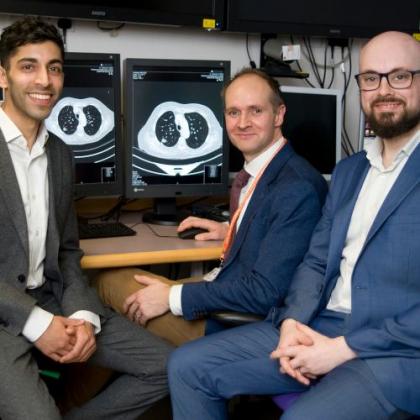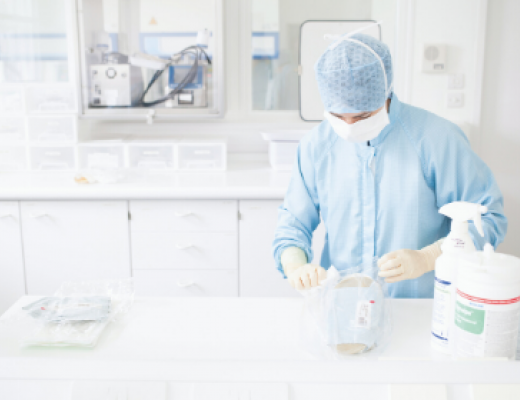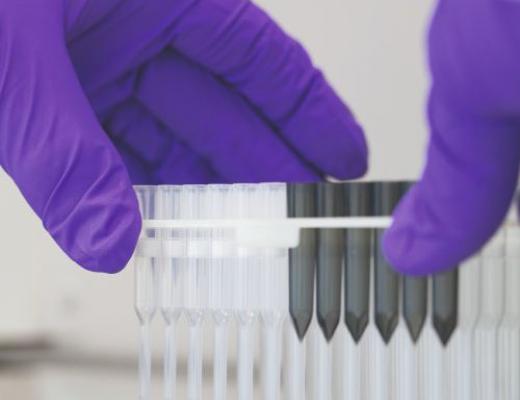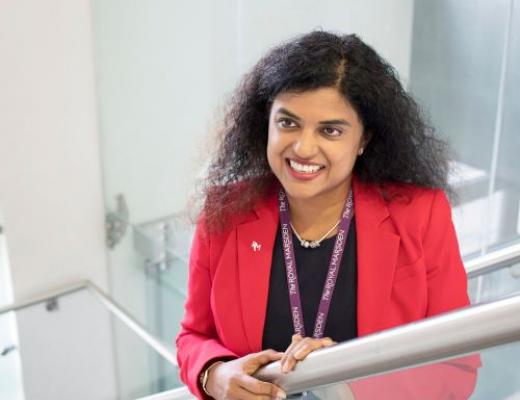Funded by The Royal Marsden Cancer Charity, Dr Richard Lee, Consultant Physician in Respiratory Medicine and Early Diagnosis at The Royal Marsden, is using the latest in technology to benefit cancer patients. We speak to him to find out more.

Q&A with Dr Richard Lee
Can you tell us more about the research you’re leading?
We’re investigating how we can utilise the latest technology in artificial intelligence (AI) to provide better care and treatments for cancer patients during the COVID-19 pandemic. Prior to the pandemic we were already carrying out work using artificial intelligence to help early diagnosis of lung cancer and identify subtle changes in patients that would help understand differences in response to treatment.
Why is this important?
COVID-19 is a serious viral infection that can affect people of all ages but is likely to impact cancer patients differently who are at increased risk of developing the virus and more vulnerable due to their weakened immune systems. A key challenge we have identified during the COVID-19 pandemic is that it can be difficult to distinguish symptoms of immunotherapy side effects from the virus and other infections such as infective pneumonia as these can all often present in a similar way. These side effects might include cough, breathlessness and changes of CT scan imaging.
What difference could this study make?
We hope AI tools will help us to better analyse scans from cancer patients, with the results then helping clinicians to balance and prioritise between targeting treatment for the infection and targeting cancer treatment. Being able to distinguish between infections and side effects will give us crucial information and helps us to treat patients in the best possible way.
An additional part of this study will be to diagnose subtle changes of lung cancer recurrence earlier so that it might be treated more effectively.
What happens in the trial and when do you expect results?
Unlike a traditional trial, we’ll be using CT scan images that already exist of cancer patients who have and haven’t tested positive for COVID-19. The advantage to having the data ready to use is that we should be able to fast track our research, enabling us to gather results quickly and effectively which will directly benefit cancer patients and improve their quality of life at this challenging time.
How are you able to do this, in such a short time?
We’re very thankful for the support of The Royal Marsden Cancer Charity who have funded the study. We’re working with Trusts across the UK, to ensure cancer patients benefit on a national scale. It’s important that our work is collaborative, and by working at a fast pace it means we can hope to have an impact at a time when patients need it the most.
The Royal Marsden and ICR have launched several critical research studies such as this at unprecedented speed, with The Royal Marsden Cancer Charity needing to raise over £500,000 over the coming weeks to ensure support for the research studies can continue.
Professor David Cunningham, Consultant Medical Oncologist at The Royal Marsden and Director of the NIHR Biomedical Research Centre at The Royal Marsden and Institute of Cancer Research said: “We are uniquely placed to look at COVID-19 in a cancer setting, investigating the pandemic’s impact across a wide range of patients. These trials call upon our multidisciplinary expertise in areas such as systemic therapies, radiotherapy, circulating tumour DNA which is detectable in blood tests, surgery and holistic care.”
“Teams have been working at pace to establish studies that adhere to our usual rigorous protocol; each will have varying durations, with a focus on immediate impact through to longer term understanding of this novel virus. Importantly, with commercial, NHS and academic partners across the country, and thanks to fundraising from The Royal Marsden Cancer Charity and support from The NIHR Biomedical Research Centre we hope this research will have a national and international impact.”
Find out more about other COVID-19 research here.
The study will also be supported by the NIHR Biomedical Research Centre at The Royal Marsden and Institute of Cancer Research, London in collaboration with Imperial College London.



